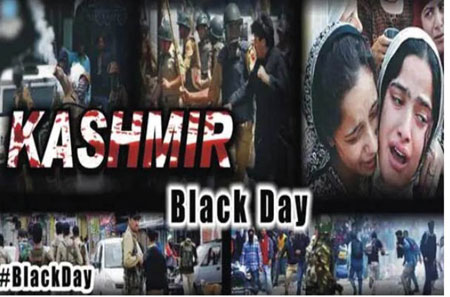
Shaimin Raja 27 October 2023
The Kashmir conflict, a longstanding issue over seven decades, remains one of the most entrenched and contentious challenges in international relations. This conflict has had a far-reaching impact on the lives of millions in the region, as well as on the relations between India and Pakistan. In this article, we’ll delve deeper into the historical complexities, the unimplemented UN resolutions, human rights concerns, the local freedom struggle, the revocation of Article 370, and the ongoing military presence in the region. Additionally, we’ll explore potential approaches to achieving a just and lasting resolution to this tragic event.
The roots of the Kashmir conflict lie in the historical context of the Indian subcontinent’s partition in 1947. Following the British withdrawal, princely states were chosen to join either India or Pakistan. Jammu and Kashmir, with its Muslim-majority population, seemed a natural fit for Pakistan. The 1947 resolution passed by the All Jammu and Kashmir Muslim Conference reflected the desires of many Kashmiris to join Pakistan. However, the hesitation of Maharaja Hari Singh, the ruler of Jammu and Kashmir, caused concerns among the local population, who feared he would align with India instead.
Recognizing the complexity of the Kashmir conflict and the potential for violence in the region, the United Nations passed resolutions in 1948/49. These resolutions called for a ceasefire and a plebiscite to allow the people of Jammu and Kashmir to determine their future. While these resolutions aimed to provide a fair and democratic mechanism for self-determination, they remain unimplemented. The continued suffering of the Kashmiri people highlights the urgency of addressing this issue.
The text initially provided highlights the serious human rights concerns in the region. Allegations of brutality, state-sponsored terrorism, and demographic changes in Kashmir are deeply troubling. It is essential to emphasize that any violation of human rights, whether by state or non-state actors, is a matter of serious concern and must be unequivocally condemned. The international community has a moral and legal obligation to hold all parties accountable for any human rights abuses and to ensure justice and accountability for the victims.
Local Freedom Struggle: Decades of violence and instability in Kashmir have led to a local freedom struggle, predominantly fueled by the grievances of the Kashmiri youth. This struggle, which began in 1989, saw Kashmiri youth taking up arms against perceived oppression. The roots of this movement are complex and multifaceted, involving political, social, and economic factors. It is vital to understand the deep-seated frustrations and feelings of marginalization that have given rise to this struggle. It is incumbent upon all stakeholders to address these grievances and create an environment where the aspirations of the Kashmiri people can be genuinely heard and addressed through peaceful means.
Revocation of Article 370: In August 2019, India unilaterally revoked Article 370 and Article 35-A of its constitution, which granted special autonomous status to Jammu and Kashmir. This move had significant repercussions and heightened tensions, with many perceiving it as a threat to their autonomy. It is imperative that this issue be addressed as part of any dialogue aimed at resolving the Kashmir conflict. The concerns and aspirations of the people of Jammu and Kashmir must be central to any discussion.
The region remains one of the most heavily militarized areas globally, with a significant Indian military presence. While maintaining order and security is important, the impact of this militarization on the lives of civilians cannot be understated. Efforts should be made to reduce the military presence and ease restrictions in the region to create an environment where civilians can lead more normal and peaceful lives.
The Kashmir conflict is a multi-faceted issue that has caused immense suffering and instability. A just and lasting resolution is imperative, with the aspirations of the Kashmiri people at its core. It is our collective responsibility to work towards peace and stability in this region, bringing an end to the protracted tragedy that has plagued Kashmir for far too long. The history of the Kashmir conflict is complex, but it is essential to remember that the central actors in this struggle are the Kashmiri people. Their rights, aspirations, and well-being must be prioritized in any solution. It is our hope that a peaceful, inclusive, and just resolution can be found, allowing the Kashmiri people to live in peace and prosperity.
